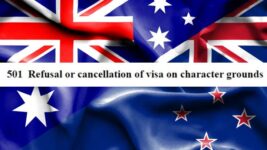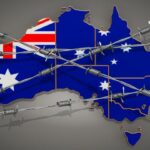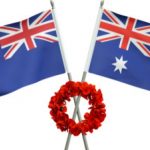Morrison’s Deporting Crime Issues to New Zealand, and It’s Starting to Feel It

They’re commonly known as 501ers, Australian migrant residents who get deported because they fail the character test contained in section 501 of the Migration Act 1958 (Cth). And the overwhelming majority of them are New Zealanders.
Since then immigration minister Scott Morrison tightened the character test in late 2014 – a sentence of at least 12 months prison means automatic deportation – more than 2,500 Kiwi residents have been turfed out of the country, shattering countless families.
These deportees are often long-term residents. Some have spent most of their lives in Australia.
But the Morrison government seems to consider these people’s criminal behaviour is somehow the result of being born a Kiwi, rather than the cultural environment they’ve been developing within whilst on Australia shores.
The character test was tightened from a pre-existing 24 month expulsion limit. The current system means people can be deported for multiple minor offences, suspended sentences, time spent in court-ordered drug rehabilitation or being required to attend residential mental health programs.
But breaking the law is criminal behaviour, regardless of whether it’s serious or minor, and New Zealand authorities are starting to comprehend the effects that Australia deporting its criminal issues into its jurisdiction is having upon their nation.
Australian criminality hits NZ
NZ’s Newshub has revealed that 501ers have committed 8,000 offences since 2015. More than 2,000 of these have been dishonesty offences. Close to 1,400 have been violent crimes. 501ers have perpetrated 57 sex offences, as well as 861 drug and antisocial behaviour crimes.
And New Zealand Police is blaming Australia’s deportees for the nation’s escalating gang problems.
Police commissioner Andrew Coster recently told parliament in response to cited differences in who’s being charged over methamphetamine crimes that “the gang environment has significantly changed as a result of returned offenders”, which “has led to the seeding of new groups.”
“At some level, what we have had through the deportation of those offenders to NZ is replication of the Australian environment,” the top cop said, adding that the rates of charging gang offenders are increasing, which reflects “the serious history that some of those people bring”.
Dealing with those turfed
While New Zealanders aren’t the only noncitizens caught up under the character test rule, they’ve overwhelmingly been the most affected.
Indeed, since late 2016, Kiwis have consistently been the largest cohort held in onshore immigration detention centres, bar a couple of months.
NZ PM Jacinda Ardern has repeatedly raised the issue with Morrison, telling him not to “deport your people and your problems” before the Sydney press in February 2020. And NZ politicians are beginning to suggest that 501ers need more of a support program similar to refugees.
The NZ government began funding an organisation called PARS in 2016 to begin providing support to 501ers on return to a country that many no longer have ties to.
PARS chief executive Tui Ah Lo told Sydney Criminal Lawyers in 2018 that her organisation supports “clients that are subject to a supervision order and are being monitored by the Department of Corrections initially on arrival,” as well as those not subject to an order but in need of support.
NZ don’t become Australia
501er Brad Sinoti was deported from Brisbane last year, having to leave behind his kids behind, after only having served six months over a drug offence.
In reference to the imported gang issues, he said it stands to reason these individuals bring the way of life they’ve learnt in Australia back to NZ.
“It just makes sense why New Zealand’s turning out to be like Australia,” he told Newshub. “It’s because the culture’s coming back here.”







